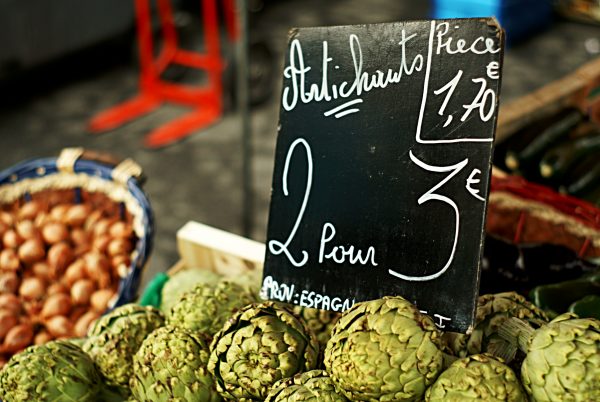Seasonal Eating
One of the most enjoyable things about living on the French Riviera is exploring the outdoor markets for fresh, seasonal produce. From Ventimiglia to Antibes, almost every town and village along the coast has its own special food market offering an enticing array of local fresh fruits, vegetables and herbs. Springtime brings an abundance of artichokes, asparagus, broccoli, fava beans, spinach, and chives, just to list a few.
The ever-changing variety of fresh, seasonal produce on the local stalls provides a constant source of inspiration for local chefs and foodies alike. What better way to celebrate Spring than with a plate of tender artichoke hearts or bowl of sweet peas with mint? Aside from the novelty, there’s plenty of evidence that following our natural instinct to eat along with the seasons is better for us and better for the planet.
When it comes to food, we’re used to getting what we want when we want it, including fruits and vegetables. Big supermarkets have made almost anything available to us all year-round, so we take for granted that we can just pick up whatever produce strikes our fancy, regardless of whether it’s in season or not.
We’re so used to convenience that it’s easy to forget that there was a time when eating local, seasonal food was the norm. These days we’ve become so distanced from our food sources that many of us have little idea where it comes from or how it was produced, let alone the effect these things have on our own health and that of the environment. Commercialism has forever changed the way food is produced, and not necessarily for the better.
Yet another advantage that comes with living on the Riviera is that having such a large choice seasonal, locally grown produce at our fingertips means that we have a unique opportunity to develop individual connections with a variety of local food vendors instead of relying on the supermarket alone. Knowing where our food comes from and sharing that information allows us to connect to the people that produce it and helps reinforce a sense of shared community.
There are many other benefits to eating seasonably. It’s usually less expensive because when produce is in season locally, the sheer abundance means it costs less. It’s simple supply and demand. That little packet of chives at the supermarket will always cost more than the bunch that is practically given away at outdoor markets in Spring. And do we really need to be eating cherries flown in from New Zealand when we can feast on our own in summer?
It not only tastes better, eating seasonal food also helps support local farmers and contributes to the local economy. When not in season, produce is grown either in massive greenhouses or shipped in from far away places. It’s picked before it’s ripe, then chilled, put on planes, boats and trucks and transported long distances. Flavour suffers as a result. Hothouse tomatoes pale in comparison with their seasonal, sun-ripened counterparts. Eating locally and seasonally is also better for the environment because food travels a much shorter distance before it reaches our plate. This cuts back on the carbon footprint and reduces pollution, which protects our planet. Seasonal produce also grows without too many toxic pesticides that contaminate our water and soil and also our own health.
Another good reason to eat seasonally is that it helps us connect with nature’s rhythm. Fresh seasonal produce is picked at its prime so it retains the maximum amount of vitamins, minerals and enzymes that are vital for our health. Keeping in step with nature by eating seasonal foods may also provide nutrients best suited for that particular time of year; warming root vegetables in winter, hydrating fruits in summer, detoxing greens and onions in Spring.
So get down to your local market and discover the best that Spring has to offer. Your local tourist office has all the information on days and hours. Eating seasonally ensures we get the best in nutrition, the best in flavour and that we never get bored with eating the same thing!


No Comment